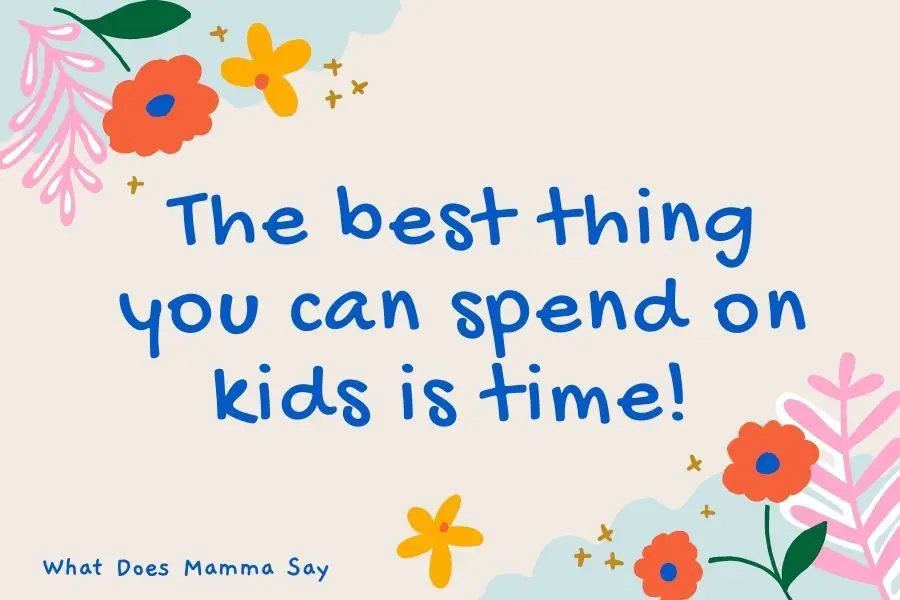Why Playing with your Child Matters – Benefits of Spending Quality Time with your Kids
When it comes to parenting, it is very easy for most parents to think about feeding their children adequately. We give them plenty of opportunities to get rest and sleep, providing structure throughout their days.
Also, we tend to consider sibling rivalries, and teaching siblings to get along, care for, and protect one another.
Finally, we think about helping them out with homework, teaching them right from wrong, and of course the dreaded discipline.
However, there is something parents don’t often think about. It is something that is commonly neglected and/or altogether forgotten.
That is parents playing with their children.
Yes, parents taking the time daily to spend quality time with their children.
Actually, I think parents of older children are more likely to set aside quality time with their children than parents of littles. However, even parents of older children neglect to spend quality time with their children daily.
Parents Playing With Your Younger Children & Jamming With Your Older Children
To the parents of older kids, I get it! The older the kids get, the more independence they want. Not only that, but life tends to get pretty busy in those latter years of child-rearing. Between school activities, clubs, music, sports, homework, and their own personal social lives, let’s be honest, kids are very active.

Spending quality time with your kids is increasingly difficult!
To the parents of little ones, I also get it! Babies, toddlers, preschoolers, and kindergarteners are little! They crawl a lot when they are playing. Even if they aren’t crawling around, they are small enough.
For parents, spending time playing with their young child, often requires getting on hands and knees and crawling around.
Plus, as amazing as their toys are for them, they are not always fun and engaging for adults.
Here you can find great educational toys for kids
Not only can it feel physically awkward, to say the least, it can also feel just plain goofy. Silly.
However, despite all the reasons playing and spending quality time with your children is difficult, it is highly beneficial to both parents and children.
Take a look below at these highly beneficial reasons for spending quality time with the family as a daily practice.
A Brief Note about Heart & Soul Time
But first, allow me to direct you to another blog post which I have written regarding Heart & Soul Time. Heart & Soul Time is uniquely different from general quality time.
Heart & Soul Time is a much more structured time that has specific guidelines that are highly suggested to follow. However, Heart & Soul Time would qualify as quality time. You can read more about Heart & Soul Time here.
Seven Highly Beneficial Reasons to Make Quality Time a Daily Practice
- Parents Playing with their Children Model Social, Mental/Emotional Skills.
- Inspire dreams in your older children.
- Solidify and strengthen bonds between us parents and our children.
- Build language skills
- Encourage communication throughout each stage of child rearing.
- Establish trust.
- Increase cooperation when it comes to helping out around the house and adhering to rules.
What does all this mean anyway? Take a look below for a better understanding of these seven benefits. Start making quality time with the family a daily practice today.
7 Reasons to Make Quality Time With the Family A Routine
1.Parents Playing with their Children Model Social, Mental/Emotional Skills
Yes! It is true! Kids are highly imaginative, especially the little ones running around the house. My son can imagine just about anything. He can create his own world using a combination of several different toys and blocks.
Did you know there are multiple facets of the imagination, each of which we use daily?
According to the research of Dr. Murray Hunter of the University of Malaysia Perlis, there are eight types (or ways in which we use our imagination).
To name them, they are:
Effectuative Imagination
Intellectual Imagination
Imaginative Fantasy Imagination
Empathy Imagination
Strategic Imagination
Emotional Imagination
Dreams
Memory Reconstruction.
For more information on these and how they are defined, check out this article on the Eight Types of Imagination.
The imaginations of small children are in the early stages of development. Imagination is very much in the foreground of their play. When parents spend time playing with their young children, they can utilize those big imaginations as teaching tools.

Parents can model each facet of imagination. Through a parent’s ability to engage in imaginative play with their kids, they can teach the complex ideas necessary for humans to function in society, both cognitively, mentally, emotionally. It may be difficult to understand and unpack this concept, so let me provide you with an example.
Read more about play-based learning and its benefits
An Example of Empathy & Emotional Imagination
Empathy Imagination helps a child understand what others are experiencing emotionally from the perspective of the other. Emotional Imagination is when the child begins to act out emotional dispositions within a scenario.
Over the last two years, my husband and I have committed to spend time playing with our young child. We have played countless scenarios with our son in which a character is on an adventure and somehow gets hurt. These characters range from a stuffed animal, plastic animal, dinosaur, Lego person, or P.A.W Patrol Pup, etc.
During each of these scenarios, there is always a friend or family member who will come to help out. These friends and family members often express great sadness. While the character is healing up and resting from the accident, friends and family will come for visits.
During these visits, they exchange stories about accidents they have had and how they have healed and recovered. Likewise, there have been many scenarios we have played out in which another character insults and/or physically harms the protagonist. (Again this is usually a stuffed animal).

In these scenarios, the protagonist’s parents and/or friends will come alongside and provide care and comfort to their emotionally hurting friend. It is one thing for children to play out these scenarios with other children. That is also important and I don’t want to disregard the need for it.
However, the reason I share these important components of a child’s playtime with the parent’s involvement is because these scenarios provide a perfect platform for teaching, modelling through play, and fostering empathy and emotional response in real-life circumstances.
2.Daily Quality Time With the Family will Strengthen Bonds
It seems obvious that spending time with the family will solidify and strengthen the bonds you have with your children.
Did you know that fathers who take at least two weeks of leave at the arrival of the baby have increased life-long benefits related to the bond between them and their baby?
In fact, a US study shows that “leave-taking, and particularly 2 weeks or more of leave, is positively associated with children’s perceptions of fathers’ involvement, father-child closeness, and father-child communication.” For more information, read the article fathers’ paternity leave.
It is true that there is a correlation between a father who takes at least two weeks leave at the baby’s arrival and that father’s engagement with the child through the years that follow. In other words, fathers that take longer leaves are generally the same fathers that are going to be more engaged and active in their fatherly roles with their kids.
Despite that correlation though, the idea of building the foundation for quality time from the start, and making it a daily priority is inevitably going to have positive outcomes on the bond that parents have with their children.
That bond is crucial. Trust, communication, and the ability to inspire dreams in your children (all discussed below) rely strongly on an established bond between parent and child.
3.Daily Quality Time with The Family Will Increase Language Skills
Parents who regularly prioritise playing and spending time with their children (whether young or older) help increase their children’s language skills.
Parents and adults have a much larger bank of words and vocabulary than children do, especially very young children. When parents interact with their children whether it be through play or conversation, or both, they often and unintentionally use big words.
Many times those words are confusing and complicated for children. However, as parents unintentionally use big words, children learn and add them to their word banks.
Even if parents choose simpler, less ‘big’ words while playing with their children, just engaging with them is enough to encourage language development.
If parents regularly talk, tell stories, explain scenarios and events, provide chronologies and sequences, and in general, have conversations with their young children through play and their older children through other forms of quality time, they will organically increase their word banks.
This happens just by picking up on words and language their parents use.
Children will also pick up on other, more complex subtleties of language. For example, the rules for plurals, various sentence structures, syntax and more.
4.Daily Quality Time with the family will Increase Trust
How often do you include your children in small decisions? Large decisions? Do you ever seek out your children’s thoughts and opinions on things?
Does your child trust that when he/she shares something, you will help if needed? Does your child know you will protect his/her privacy and seek to resolve the situation in the best way possible?
Establishing trust amongst all members of the family is a necessary component of healthy family dynamics. Without trust, children lack confidence in their identities, capabilities, and decision making efforts.
Trust happens when strong bonds are formed. Trust is a natural outcome of relationship. When strong bonds are formed in a relationship, trust is inevitable.

We already discussed the bond that is established and strengthened by parents playing with their children and having daily quality time with them.
So it follows that when parents take the time for daily quality time with the family, there will be an increase in trust and vice versa.
Building trust takes time and effort. It is often achieved through the practice of regularly helping each other out when necessary. Also, solving problems together, laughing together, and having meaningful conversations with one another builds trust.
Children need to know their parents care, are interested, are listening, and overall, they desire their time. Parents can show these things by simply spending time with their kids daily.
Although these things are not limited to daily quality time, daily quality time with the family provides a platform where these things can happen.
5.Daily Quality Time With Your Family will Encourage Communication
Communication with your children (or the lack of communication) is in large part what makes parenting so complicated.
In the early years, children are exploring new words and learning the social rules of conversation, and they talk a lot.
However, as they get older and more independent, they begin to talk much less, at least to their parents. This tendency makes it very difficult to communicate with them.
Parents can ease the difficulty of communication between them and their children by simply making daily quality time a priority. Daily quality time with your children lays a solid foundation for opening up and encouraging communication amongst children.
As children become more independent, they may still prefer talking with their friends over their parents.
However, knowing they have that time each day, and in particular, knowing that their parents desire to spend time with them will increase their comfort around sharing things with their parents.
It doesn’t take a genius to figure out that when your kids are comfortable communicating, they are more likely to open up and share about their lives.
6.Daily Quality Time with your Family will Inspire Dreams in your Older Children
I think we all can agree that our children are not going to crawl around on the ground pushing cars and trucks forever. Older children may want to throw a ball, have a music jam session, shop, go to a restaurant, take a drive, paint their nails, etc.
Whatever the activity, spend time with your older child. Daily quality time with older kids will give them opportunities to peek into their parent’s lives.
There are things they will begin to notice about their parents (aside from the fact that it is their parents). Likewise, there are conversations parents are able to have with their older kids about life, happiness, true joy, career goals, relationship goals, priorities, and much more.
These conversations, coupled with the bond that is established, do not feel nagging to them. Instead, they are moments parents can teach about the realities of life. Parents can inspire hope, build on dreams, and increase the confidence of their teenagers.
Through words and actions, parents can speak directly to their older child’s spirit and show them who they are. But in order for this to be effective, you (the parent) must make it a priority to regularly spend quality time with the family!
Will every day be an opportunity for a deep parent-teenager conversation?
No.
Sometimes it will be just a fun and loud jam session. However, every day will be an opportunity to build on a foundation. That foundation will increase the bond and establish that trust.
Only then will they permit their parents to speak into their lives. And when those days come, all those loud obnoxious jam sessions will prove absolutely worthwhile.
7.Daily Quality Time with your Kids will Reward Parents with an Increase in Cooperation
According to Amy McCready, investing in quality time with your kids satisfies their two most intrinsic needs. They are the need for significance and the need for belonging. Check out McCready’s book, If I Have to Tell You One More Time.

Daily quality time done consistently results in an increase in cooperation and a reduction in attention-seeking behaviors and power struggles. As I have already stated above, parents and children will make strong mental and emotional connections.
In addition, parents who are spending time playing with their children are reinforcing just how important their children are to them.
Because of those strong connections, children will know their place within the family structure. They will have a strong sense of significance and belonging in their families.
These two things combined help children understand their roles and responsibilities. Everybody contributes and everybody helps. Yes, it will still be a drag. Even so, children will be more willing to cooperate in order to contribute as part of the family.
For the same reasons, children are more likely to comply with boundaries and rules. They will better understand that boundaries and rules are established and enforced to keep us and others safe within our communities.
Additionally, children are more likely to trust that their parents have established and enforced boundaries and rules because they often know what is best for them.
One Last Thing About Parents Playing with your Children…
There are so many amazing benefits of parents spending time playing with their young child and in general, creating space for quality time with their children.
I extend this small piece of encouragement to all the parents reading this today. Your children are worth every bit of your love and attention. You also are worth every bit of your child’s love and attention.
Though there are many other ways to demonstrate our love, if it is not coupled with attention, it may be forgotten.
So why not start making daily quality time with your children a priority today? Find a time that works each day. Put it on the schedule if you have to until it becomes habitual.
And watch the benefits begin to take root in your relationships with your children!
Author

Sarah is currently a lifestyle blogger and stay-at-home wife and mother. Sarah started her blog, Wholeheartedly-Sarah in the fall of 2019.
Wholeheartedly-Sarah is packed with blogs filled with parenting-related inspiration, tips, and tricks from breaking bad habits to structuring a child’s day while also allowing for ample free play. As a former teacher and educator, Sarah is actively working on developing curricula for homeschooling moms and charter school teachers of students ranging from preschool to second grade. Her curricula include themes in sensory play, number sense and foundational mathematics, STEM education, discovering and mastering all things alphabet, seasons, plant life, weather, and more. Sarah is excited to be launching the first phase of her curriculum this fall.
Sarah also writes about cultivating authenticity, deepening relationships, and prioritizing personal growth. She is a firm believer that despite the necessity of hard work and building a solid and stable career, at the end of the day what matters most is not what we did, but who we loved. Sarah is very close to publishing and launching her first book, the Live Heart-Fully Journal, a 52-Week guided journal to feeding your soul and cultivating your relationships.
Sarah has been married to her husband for nearly eight years. Together they have one five-year-old boy and live in northern California. She loves spending time with her husband and son exploring the natural world through travelling, hiking, camping, biking, swimming, and just about anything outdoors. She also enjoys a good cup of coffee, reading memoirs, listening to music, and having meaningful conversations with her husband and friends. Sarah holds a B.A. degree in Comparative Literature and previously worked as an English teacher in the California public school system.

Hi there! We are Cristina and Monica, moms, teachers and friends. Read more about us and our mission here.


Great article! I’ve realised recently that we don’t spend enough time together as a family. Because my kids are still very young, there’s always a parent with them but usually the other parents goes and does housework or takes a break. This has further spurred me on to prioritise having quality family time together.
It’s my biggest goal in life to have a good bond with my children. I hope we never lose sight of quality time together. This is a great list!
Time goes so fast it’s so important to spend quality time with your children. I love this list thanks for sharing this!
I love all the reasons you mentioned to spend quality time with the family. We always have a family board game night every night and try to squeeze in some quick card games every day of the week. Kids love it and look forward to it always.
I love this! I am going back to work after a year of staying home with my son, and I want to make sure that I prioritize quality time while I’m with him.
I’ve been so guilty of this. With the so many things I have to do daily, I find I just schedule an hour or so to play with my kids, but guess I’ll start spending a little more time with them.